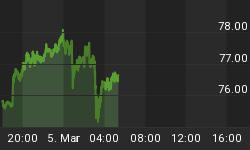At present, there is a lot of confusion amongst the investment community and opinion is divided as to whether we will witness inflation or deflation.
On one hand, the deflationists are claiming that given the extremely high debt levels in the West, further inflation is impossible. On the other side of the argument, many proponents of inflation are calling for Zimbabwe style hyper-inflation. In this business, everyone is entitled to their opinion; however it is my contention that we will get neither deflation nor hyper-inflation. If my assessment is correct, once business activity picks up, our world will have to deal with high inflation.
Although I have great sympathy for the deflation crowd, given the reckless attitude of the central bankers and their ability to create debt-based money, I do not believe deflation (contraction in the supply of money and total debt) is very likely.
For sure, in this post-bubble environment, American consumer debt continues to contract but this is being more than offset by the expansion in federal debt. Over the past year alone, federal debt in America has surged from US$9.645 trillion to US$11.813 trillion. In other words, during the past twelve months, American federal debt has risen by a shocking 24.47% and it now stands at 83.52% of GDP! Now, given the ability of the American establishment to essentially create dollars out of thin air, I have no doubt in my mind that it be able to inflate the economy. However, this will come at a huge cost and the victim will be the American currency.
In fact, the recent weakness in the US Dollar is a sign that central-bank sponsored inflation has started to dominate the private-sector debt contraction in the West. Furthermore, over the past few weeks, various governments have issued US Dollar-denominated debt and this suggests that the carry-trade is back in vogue. In a startling move, Germany recently announced that it plans to borrow money in US Dollars!
Now, given the ongoing federal debt inflation, debasement of paper currencies, sky-high budget deficits and competitive currency devaluations, the macro-economic environment has never been better for precious metals. Yet, both gold and silver continue to frustrate the bulls by staying below the record-highs recorded in spring 2008.
So, what is going on here? Have we already seen the end of the precious metals bull-market or are we about to witness an explosive rally? Before I attempt to answer this question, I want to make it clear that even though gold failed to better its all-time high during last autumn's panic, it was the only asset (apart from US Treasuries) which stayed relatively firm. And looking at the various markets today, gold is the only asset which is flirting with its all-time high. So, whether you like it or not, gold deserves some credit for fulfilling its role as a safe haven.
Now, unlike some of the die-hard gold bugs, I don't believe that gold is the ultimate asset to own at all times. Without a doubt, there have been times in history when gold has proven to be a lousy investment. For instance, between 1980 and 2001, the nominal price of the yellow metal fell by an astonishing 70%. This horrible price action spawned an entire generation which grew up hating gold and up until a few years ago, the vast majority considered gold a barbaric relic.
However, during other periods in history, when macro-economic uncertainty was high and inflationary expectations were running out of control, gold turned out to be a fantastic asset to own.
If my take on the macro-economic situation is valid, then we are in such a period now and gold must form a part of every investment portfolio.
You may remember that over the past year, central banks have injected trillions of dollars into the banking system and it is only a matter of time before inflationary expectations start spiralling out of control. Up until now, this 'stimulus' money hasn't permeated through the economy in the West but once money velocity picks up, prices will start rising and the investment community will become very concerned about inflation. When the deflation scare abates and people start protecting the purchasing power of their savings, capital will start to flow towards precious metals.
Long-term clients and subscribers will recall that about two years ago, I highlighted gold's tendency to rocket higher every other year. Figure 1 captures this trend perfectly and you can see that since the outset, gold's bull-market has been punctuated by lengthy consolidations and the yellow metal has surged to a new high every alternate year.
Figure 1: Is gold about to shine?
Source: www.stockcharts.com
So, if gold remains in a bull-market and its trend consistency is intact, its price should surge over the following months. Conversely, if the price of gold fails to climb above its all-time high before year-end, it should start to ring alarm bells as this would open up the possibility that the bull-market may be over. Remember, certainty does not exist in the investment world and savvy investors should remain open to all outcomes.
Now, given the uncertainty in the world today and the ticking inflationary time-bomb, my view is that gold will soon embark on its north-bound journey. So, I suggest that investors hold on to gold and the related mining companies which will probably continue to perform well until next spring.
As far as silver is concerned, it has always been a high-beta play on the direction of gold. If the next up leg in gold's bull-market materialises, the price of silver will also head towards the heavens. Accordingly, investors may also want to allocate a portion of their investment portfolio to silver bullion and silver producing companies.















